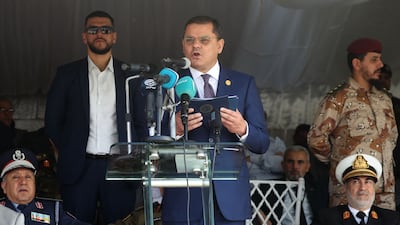Abdul Hamid Dbeibah, the head of one of Libya's two rival governments, said his Tripoli-based administration was ready to hold delayed elections this year, vowing that 2023 will be one of “elections and the unity of institutions”.
Engulfed by more than a decade of civil conflict, Libya is divided between Mr Dbeibah's government in Tripoli and a rival government based in eastern Libya headed by Fathi Bashagha, a former interior minister.
“There are still those with despicable attempts to drown us in the quagmire of political conflict. We will spare no effort in preserving Libyan blood, unity and sovereignty of Libya, whatever the cost to us,” Mr Dbeibah said in a national address on Monday.
Mr Dbeibah's government was appointed under a UN process in early 2021 to oversee national elections in December that year. The vote was never held following disagreements among rival factions and prominent candidates over the laws governing the election.
Libya's eastern-based parliament, the House of Representatives, called on Mr Dbeibah to step down after the failed election attempt, saying his mandate had expired. The parliament voted to appoint Mr Bashagha prime minister in February last year after Mr Bhashagha rejected its calls.
Last week, UN special envoy for Libya Abdoulaye Bathily urged political leaders to avoid any escalation that would threaten Libya's stability, which he described as “fragile.”
“Best wishes to all people in Libya on the occasion of the new year. I hope 2023 will be a year to make up for lost opportunities and find a lasting solution that paves the way for holding elections and building sustainable peace and prosperity in Libya,” Mr Abdoulaye said in a statement.
Libya plunged into chaos following an uprising that toppled and killed dictator Muammar Qaddafi in 2011.
Late last week, Libyan military commander Khalifa Haftar said there was a “last chance” to draw up a road map and hold elections in Libya in 2023, stressing that the country's unity was “a red line that cannot be violated”.


